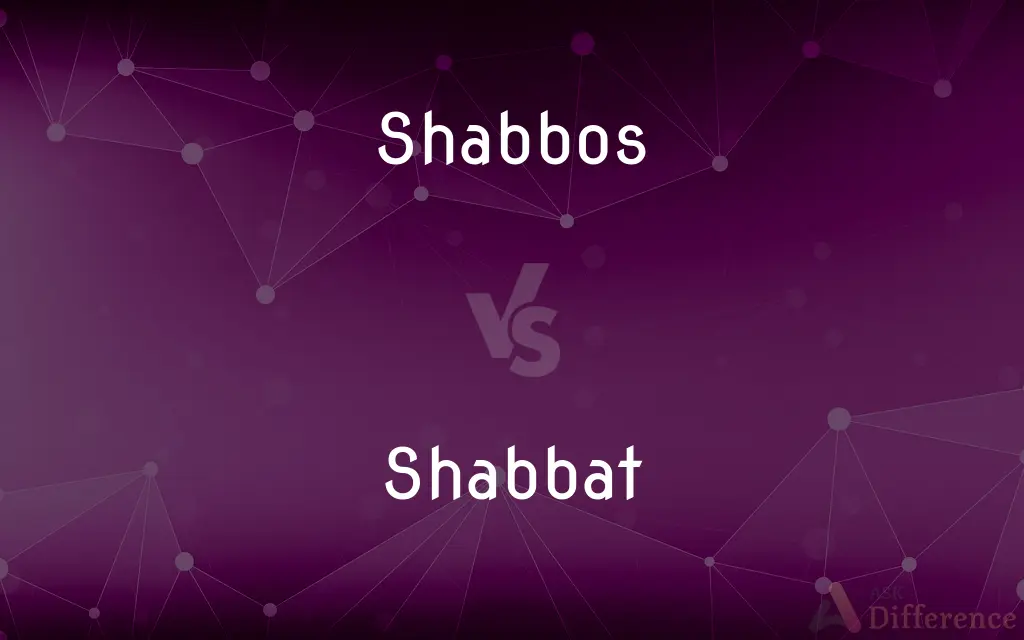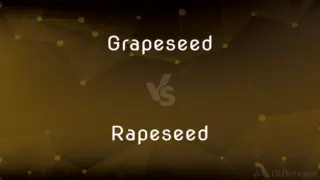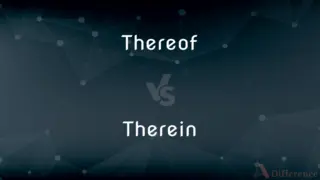Shabbos vs. Shabbat — What's the Difference?
By Urooj Arif & Fiza Rafique — Updated on March 31, 2024
Shabbos and Shabbat both refer to the Jewish Sabbath, celebrated from Friday evening to Saturday evening, but differ linguistically; "Shabbos" is Yiddish, while "Shabbat" is Hebrew.

Difference Between Shabbos and Shabbat
Table of Contents
ADVERTISEMENT
Key Differences
The term "Shabbos" is derived from Yiddish, a historical Jewish language that developed in Central and Eastern Europe, blending Hebrew, German, and Slavic elements. It represents the Ashkenazi Jewish tradition. On the other hand, "Shabbat" is the original Hebrew term used in the Torah and by Jewish communities worldwide, especially in liturgical contexts and among Sephardi and Mizrahi Jews.
Both terms denote the seventh day of the Jewish week, dedicated to rest and spiritual enrichment in accordance with the Torah's commandment. On Shabbos (or Shabbat), traditional Jews refrain from work and engage in prayer, family meals, and Torah study. The difference in terminology does not imply a difference in the observance's nature but reflects linguistic and cultural diversity within the Jewish community.
In religious texts and formal Jewish education, "Shabbat" is more commonly used, emphasizing its Hebrew roots and universal recognition among Jews. Conversely, "Shabbos" is often heard in casual conversation, particularly within Ashkenazi communities, where Yiddish expressions and terms are prevalent. This usage underscores the cultural heritage and identity of Ashkenazi Jews.
While both terms refer to the same day of rest, their usage can indicate the speaker's cultural background or linguistic preference. For example, in Israel and among Hebrew speakers, "Shabbat" is universally used, whereas "Shabbos" might be more commonly heard in communities with strong Yiddish influences, such as certain Orthodox and Hasidic groups in the United States and Europe.
Regardless of the term used, the day is marked by lighting candles, reciting blessings, and sharing festive meals. Both "Shabbos" and "Shabbat" carry the same spiritual significance, embodying a time for rest, reflection, and renewal in the Jewish faith.
ADVERTISEMENT
Comparison Chart
Language of Origin
Yiddish
Hebrew
Cultural Association
Ashkenazi Jewish communities
Jewish communities worldwide
Usage Context
Informal, especially in Ashkenazi communities
Formal and universal among Jews
Linguistic Influence
German, Hebrew, and Slavic
Ancient Hebrew
Common in Regions
Eastern and Central Europe, specific communities in the US and other countries
Israel, Sephardi and Mizrahi communities globally
Compare with Definitions
Shabbos
The Yiddish term for the Jewish Sabbath.
We prepare traditional foods for Shabbos every week.
Shabbat
The Hebrew term for the Jewish Sabbath.
Shabbat candles are lit 18 minutes before sunset.
Shabbos
A day of rest in the Ashkenazi Jewish tradition.
On Shabbos, we refrain from electronic devices.
Shabbat
Observed from Friday sunset to Saturday nightfall.
On Shabbat, we attend synagogue services.
Shabbos
Celebrated from Friday evening to Saturday evening.
The family gathers for the Shabbos meal right before sundown.
Shabbat
A universal day of rest and worship in Judaism.
Shabbat is a sacred time for Jews around the world.
Shabbos
Marked by prayer, rest, and family time.
Shabbos is a time for prayer and reflection in our community.
Shabbat
Involves abstaining from work and focusing on spirituality.
We use Shabbat to disconnect from the week's hustle.
Shabbos
Reflects the cultural heritage of Ashkenazi Jews.
Shabbos songs are sung in Yiddish in my grandparents' home.
Shabbat
Symbolizes renewal and peace.
Shabbat meals bring the family together for peaceful reflection.
Shabbos
The Sabbath.
Shabbat
Shabbat (, , or ; Hebrew: שַׁבָּת, romanized: Šabat, [ʃa'bat], lit. 'rest' or 'cessation') or the Sabbath, also called Shabbos (Yiddish: שבת) by Ashkenazim, is Judaism's day of rest on the seventh day of the week—i.e., Saturday. On this day, religious Jews remember the biblical stories describing the creation of the heaven and earth in six days and the redemption from slavery and The Exodus from Egypt, and look forward to a future Messianic Age.
Shabbos
(Judaism) Shabbat or shabbat (the biblical seventh-day Sabbath).
Shabbat
The Jewish Sabbath, observed from sundown on Friday until sundown on Saturday.
Shabbat
Alternative case form of Shabbat
Common Curiosities
Are there any rituals exclusive to Shabbos or Shabbat?
The rituals are the same; differences in terminology do not affect religious practices.
Why do some people prefer "Shabbos" over "Shabbat"?
Preference often aligns with cultural identity or familial tradition, especially among Ashkenazi Jews.
Can "Shabbos" and "Shabbat" be used interchangeably?
Yes, though usage may depend on cultural or linguistic context.
Are there different foods associated with Shabbos or Shabbat?
Traditional foods are similar, though there may be cultural variations in recipes.
How is the start of Shabbos or Shabbat marked?
Both are marked by lighting candles and reciting blessings on Friday evening.
Can "Shabbos" be used in formal Jewish education?
"Shabbat" is more commonly used in formal settings, but "Shabbos" may be used informally or in cultural contexts.
Is there a difference in the observance of Shabbos vs. Shabbat?
No, the observance is the same; the difference is linguistic.
How do non-Jewish people refer to this day?
Non-Jewish people typically use "Sabbath" or "Shabbat" when referring to the Jewish observance.
Is knowledge of Hebrew required to observe Shabbat?
No, observance is based on religious practice, not language proficiency.
What is the significance of ending Shabbos or Shabbat?
The conclusion, marked by the Havdalah ceremony, signifies the separation between the sacred day and the rest of the week.
Does the term used change the spiritual significance of the day?
No, both terms embody the same spiritual importance and practices.
How do children learn about Shabbos or Shabbat?
Through family traditions, religious education, and community participation.
Does the choice of term affect community belonging?
It can reflect one's cultural background or community, but it does not determine belonging.
Why might someone in Israel prefer "Shabbat"?
"Shabbat" is the Hebrew term and is universally used in Israel due to its Hebrew-speaking majority.
Are there specific prayers for Shabbos different from Shabbat?
The prayers are the same, regardless of the term used.
Share Your Discovery

Previous Comparison
Grapeseed vs. Rapeseed
Next Comparison
Thereof vs. ThereinAuthor Spotlight
Written by
Urooj ArifUrooj is a skilled content writer at Ask Difference, known for her exceptional ability to simplify complex topics into engaging and informative content. With a passion for research and a flair for clear, concise writing, she consistently delivers articles that resonate with our diverse audience.
Co-written by
Fiza RafiqueFiza Rafique is a skilled content writer at AskDifference.com, where she meticulously refines and enhances written pieces. Drawing from her vast editorial expertise, Fiza ensures clarity, accuracy, and precision in every article. Passionate about language, she continually seeks to elevate the quality of content for readers worldwide.














































